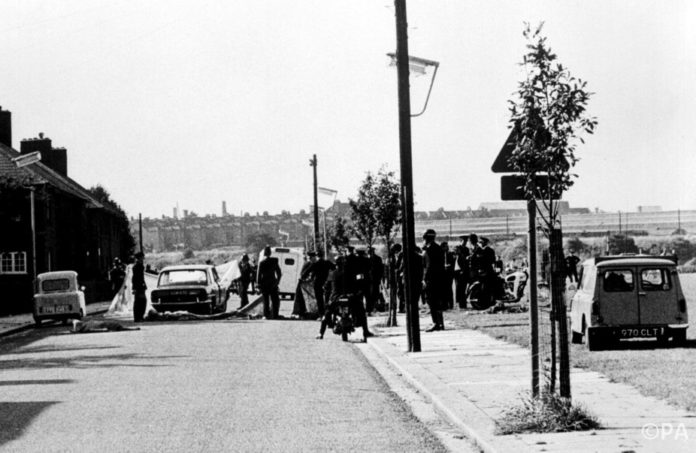
By Yvonne Jewkes, University of Leicester
The news that Harry Roberts is to be released from prison – potentially within days – has been greeted with outrage among the police. But after 48 years in prison, it’s time the knee-jerk reactions stopped. Roberts committed a particularly serious crime but has faced extraordinary opposition to his release.
Roberts was convicted of killing three policemen in 1966 and was sentenced to life, with a minimum term of 30 years. He had shot the plain-clothes officers from inside a van because he feared they were about to find his weapons.
I interviewed Roberts in 1999, while carrying out research in a “low” medium-security prison. He was being prepared for release by being taken on visits to a nearby city and his observations about a modern world that moved “at a million miles an hour” were striking. They contrasted strongly with his recollections of leaving court in 1966 and being driven in a black Mariah, with police motorcycle escorts in tin helmets and garters, making a slow procession through crowds of football fans leisurely walking to the local ground.

Roberts before his sentence.
PA
As it turned out, his expectations that he would soon be freed were short-lived due to a number of unfounded allegations, including that he had received contraband and made unauthorised visits to London. These were stories that Roberts claims were fabricated at the very time that the Parole Board recommended he was safe to be released.
In October 2001 he was recalled to closed prison conditions and placed in solitary confinement, where he was informed that more allegations had been made against him that were so sensitive they could not be disclosed to him or his solicitor. He was also told the person who made the allegations had the right to remain anonymous.
A “specially appointed advocate” represented his interests at his parole hearing, but was not able to tell him or his legal team what the evidence against was. In a 2004 article in The Independent, Roberts said his continued imprisonment amounted to “institutionalised vengeance”. His solicitor added: “I’ve never really believed in the idea of conspiracy theories until this case. I feel there is a concerted effort to prevent Harry Roberts from ever leaving prison.”
Crime and punishment
The Police Federation has greeted news of Roberts’ release in the most emotive terms. Over the years, this organisation seems to have had an insidious influence on publicity surrounding the case. Spokesmen have spoken of their sense of “betrayal” at this “scandalous, hurtful and abhorrent decision which opens the door even further for those who have scant regard for law and order”.
And significantly, Steve White, chairman of the Police Federation added: “Custodial sentences are about the protection of the public, but also about punishment.”
This raises the obvious question of how much punishment is enough. One would think that 48 years in prison might qualify, given that a “just” amount of
punishment is usually regarded as not exceeding that which is necessary to prevent the criminal from doing the same thing again and sufficient to prevent others from committing similar crimes.
Roberts’ crime and punishment seem peculiarly of their time. The murder of three policemen so soon after the abolition of capital punishment (eight months previously) chilled a public still basking in the warm glow of World Cup victory a fortnight earlier. Back in those days a long sentence was one of four years or more and few people served more than ten years. But like a handful of other notorious cases – the Krays, the great train robbers and the Moors murderers – there was a feeling that, with the end of the death penalty, a new breed of dangerous offenders was literally getting away with murder.
The judge who sentenced Roberts recommended he serve a minimum of 30 years and said during the trial that “this is one of those cases in which the sentence of imprisonment for life may well be treated as meaning exactly what it says”.
Harry Roberts is now an elderly man of 78, but he can look forward to seeing out his days as a free man – albeit on licence. But he may be the last of his kind. Last year, Theresa May revealed plans to raise the sentences of those who kill police officers to the “whole life” category – a promise she reiterated following the Parole Board’s decision on Roberts. Other “cop killers” may in the future find their prospects of proving they have reformed while in prison have disappeared altogether.
![]()
Yvonne Jewkes receives funding from the Economic and Social Research Council (ESRC).
This article was originally published on The Conversation.
Read the original article.




















